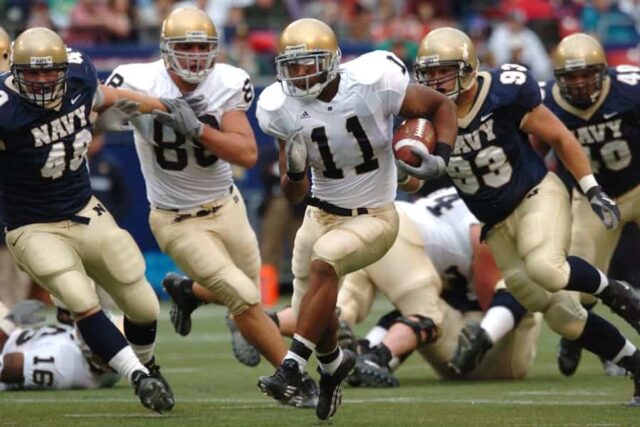American football, with its fast-paced action and widespread popularity in the United States, has captured the hearts of millions. However, a question often arises: Is American Football in the Olympics? Despite its global appeal in recent years, the sport remains absent from the Olympic Games. This article will explore the reasons behind this exclusion, the efforts to bring it into the Olympic spotlight, and whether its inclusion is feasible.
In this detailed guide, we will address key topics such as the history of American football’s Olympic journey, the challenges of global adoption, and the initiatives aimed at expanding its international presence. By the end, you’ll understand why this beloved sport faces hurdles and what its Olympic future could look like.
Is American Football in the Olympics?
No, American football is not currently in the Olympics. While it is hugely popular in the United States, its limited international participation and challenges in adapting to Olympic requirements have prevented its inclusion. However, efforts are ongoing to increase global interest and establish a format that could make Olympic participation a reality in the future.
Why Is American Football Not In The Olympics?
Despite its massive following, American football has yet to make its Olympic debut. One key reason lies in its limited global appeal. Unlike soccer or basketball, which have universal participation, American football primarily thrives in the U.S. and a handful of other countries. The complexity of the sport is another barrier. American football requires specialized equipment, a large roster of players, and extensive training, making it challenging for nations with fewer resources to adopt. Additionally, the duration of games, which often exceeds three hours, contrasts with the shorter formats favored by Olympic organizers.
Player safety is also a significant concern. The physical nature of the sport, with its high risk of concussions and injuries, has raised questions about its suitability for a multi-sport event like the Olympics. Efforts by organizations like the International Federation of American Football (IFAF) aim to address these issues. Introducing flag football as a less intensive, more accessible version could pave the way for Olympic inclusion. Finally, the Olympic committee considers a sport’s ability to attract new audiences. While American football draws millions of viewers in the U.S., its limited international fan base has hindered its acceptance.
History Of American Football And The Olympics
The journey of American football toward Olympic inclusion is marked by its U.S.-centric origins, global expansion efforts, and the introduction of flag football as a more accessible alternative.
Early Development And U.S. Roots
American football emerged in the late 19th century, evolving from rugby and soccer, and quickly became a defining feature of U.S. sports culture. However, its limited global reach prevented consideration for the early Olympics, which prioritized sports with universal appeal.
Efforts To Globalize The Sport
Starting in the mid-20th century, organizations like the NFL promoted American football internationally through events such as the NFL International Series. The formation of the International Federation of American Football (IFAF) in 1998 further boosted international competitions like the IFAF World Championship. Despite these efforts, global participation remains limited compared to soccer or basketball.
The Rise Of Flag Football
Flag football has emerged as a simpler, safer alternative, requiring minimal equipment and shorter game times. Its successful debut at the 2022 World Games renewed discussions about its inclusion in the Olympics, aligning with the International Olympic Committee’s (IOC) focus on accessibility and safety.
Challenges With Traditional American Football
Barriers to inclusion include the sport’s high costs, limited international reach, and gender participation disparities. Flag football, however, offers solutions with broader appeal and fewer logistical hurdles.
Recent Milestones
Advocacy for Olympic inclusion intensified with the NFL and IFAF’s 2021 proposal to include flag football in the 2028 Los Angeles Olympics. This marked a turning point, leveraging the host nation’s influence and highlighting flag football’s Olympic potential.
With ongoing efforts to expand its global presence, American football’s Olympic debut appears increasingly within reach.
What Are The Benefits Of Adding American Football To The Olympics?
The inclusion of American football in the Olympics, especially in the form of flag football, could bring significant benefits to both the sport and the Olympic movement. Below is a detailed discussion of the potential advantages.
Global Expansion of American Football: Adding American football to the Olympics would create an unparalleled platform for the sport to gain international recognition. Many countries, particularly in Asia, Africa, and South America, have minimal exposure to American football. Olympic participation could spark interest, leading to the establishment of new leagues and training programs globally. Moreover, the Olympics provide a unifying platform for cultural exchange, allowing nations to experience and embrace new sports. American football’s inclusion could bridge gaps and build communities through a shared passion for the sport.
Increased Viewership and Revenue for the Olympics: American football, particularly in the United States, commands a massive fan base, which could translate into increased viewership for the Olympic Games. The inclusion of the sport could draw millions of additional viewers, especially during prime-time slots, boosting advertising revenue and sponsorship opportunities. For the Olympics, this would mean a significant influx of funds, strengthening the financial health of the Games and enabling investments in emerging sports and athlete development programs.
Opportunities for Youth Engagement: The Olympics have long been a platform for inspiring younger generations, and American football’s inclusion could energize youth participation. Flag football, being a less contact-intensive version, is ideal for schools and community programs worldwide. The sport’s introduction into the Olympics could lead to a surge in youth involvement, fostering a new generation of players.
Gender Inclusion Through Flag Football: Flag football has already established itself as a gender-inclusive sport, with active participation from both men’s and women’s teams. Including flag football in the Olympics would align with the International Olympic Committee’s (IOC) goals of gender equality and diversity. This move would showcase opportunities for women to compete on the same global stage as men, further promoting inclusivity.
Economic and Social Impact: American football’s Olympic inclusion could encourage countries to invest in infrastructure and training facilities, creating jobs and boosting local economies. Moreover, it could bring people together, breaking down cultural and social barriers. The Olympics would benefit by adding a sport with a passionate fan base and a history of community building. With these compelling benefits, the inclusion of American football—particularly through flag football—has the potential to transform the sport’s global presence while adding significant value to the Olympic Games.
What Is The Future Of American Football In The Olympics?
- Global Growth and Expansion Efforts: The future of American football in the Olympics depends on its global growth. Organizations like the International Federation of American Football (IFAF) are working tirelessly to promote the sport beyond the U.S. Initiatives include developing leagues in regions like Asia, Africa, and South America, along with youth development programs that encourage participation at the grassroots level.
- Flag Football as the Pathway to Inclusion: Flag football, a non-contact version of the sport, is seen as the most viable candidate for Olympic inclusion. With its shorter games, fewer players, and reduced physicality, flag football aligns well with the International Olympic Committee’s (IOC) requirements. Its debut at the 2022 World Games was a significant step, showcasing its potential to captivate audiences and increase accessibility.
- Overcoming Challenges: While efforts are ongoing, several hurdles remain. The sport must achieve broader international participation, improve gender balance in competitions, and ensure safety standards align with Olympic regulations. These challenges are being addressed through partnerships between the NFL, IFAF, and national governing bodies.
- Timeline for Inclusion: Experts predict that American football could make its Olympic debut in the 2028 Los Angeles Games. The host nation’s influence, combined with the sport’s growing popularity, positions flag football as a strong contender. If not in 2028, the sport may aim for inclusion in 2032, provided it meets the IOC’s requirements.
- The Potential Impact of Inclusion: If American football becomes an Olympic sport, it would mark a historic moment, boosting the sport’s global appeal and creating new opportunities for athletes worldwide. It would also highlight the evolving nature of the Olympics, showcasing their commitment to diversity and modernity. With continued advocacy, collaboration, and innovation, the future of American football in the Olympics looks promising, potentially paving the way for its inclusion in the world’s most prestigious sporting event.
Conclusion
The question “Is American Football in the Olympics?” highlights the ongoing efforts and challenges faced by this beloved sport in achieving Olympic inclusion. While traditional American football’s complexity, resource demands, and limited global reach have been barriers, flag football has emerged as a promising alternative. Its accessibility, safety, and alignment with Olympic values make it a strong candidate for future Games.
Advocacy from organizations like the International Federation of American Football (IFAF) and the NFL, along with the growing popularity of flag football, have brought the sport closer to its Olympic debut. With the 2028 Los Angeles Olympics on the horizon, the potential for American football to take the global stage has never been greater. Inclusion in the Olympics would not only elevate American football’s international profile but also strengthen the Olympic Games by adding a dynamic, audience-attracting sport. The journey may be challenging, but the vision of seeing American football as part of the Olympics is one step closer to reality.
FAQ’s
Q. Why Isn’t American Football In The Olympics?
A. American football faces challenges like limited international participation, complex rules, and safety concerns, which have hindered its inclusion.
Q. What Is Flag Football, And How Does It Relate To The Olympics?
A. Flag football is a non-contact version of American football, designed to be more accessible and safer, making it a potential candidate for Olympic inclusion.
Q. Is Messi Playing In The Olympics?
A. Lionel Messi is not currently playing in the Olympics. Messi participated in the Olympics once during his career, representing Argentina at the 2008 Beijing Games, where he helped his team win the gold medal.
Q. Has Football Ever Been In The Olympics?
A. Yes, football (or soccer) has been a part of the Olympics since the early days of the modern Games, with its first inclusion in 1900.














